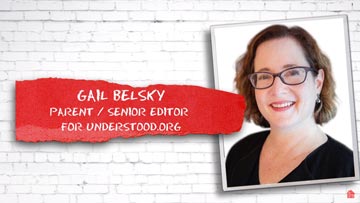- Gail Belsky is the senior editor at Understood, and a former executive editor at Time Inc.. You're also author, a writer, a blogger, and most importantly, a mother of two. Who can diagnose ADHD and how can a parent who might not have great financial resources get their kids diagnosed.
- There are a number of professionals who can diagnose. Including: psychologists, pediatricians, neuropsychologists. The key is, no matter who is making the evaluation, that they do a full and appropriate evaluation. In my case, we were referred to a neurologist by a pediatrician, a local neurologist, at a hospital who took insurance and so all we needed to do was pay a copay. It was very doable for us.
- Should you tell other parents that your child has ADHD, or should you let your child tell their story, when they're ready.
- You know, I never felt like I had anything to hide. But, you know, I didn't walk around announcing it. There was no reason to do that. As my son got older, you know, I really felt it was for him to explain to his friends, his teachers, at the way he wanted to do it, because that's part of being a self-advocate is being able to speak up, you know, on your own behalf. And as he got older, he really did that and he did it comfortably.
- So Gail, what are some of the things a parent can do to make it easier to do a homework with their ADHD kids?
- Definitely it makes it a lot easier for them, if you can break it down into smaller chunks. It becomes overwhelming and organization can be a problem for them. So the smaller the chunk, the easier they can tackle it. And I also think homework breaks are hugely important. And how you organize them and when you give them, I think is something you do, you know, in consultation, or in together with your child. But the ability to be able to take a break, reenergize and come back, at least in my household, was huge.
- Can you talk to us about the importance about creating a community when you have a child with ADHD, or any learning disability for that matter.
- Absolutely. For both parents and kids, it's essential to feel that there is a safe place where you can talk about what's happening. And people who are not judgemental is, I think, a lot of parents of kids with ADHD experience a lot of judgment and so to be able to rely on a close support network is invaluable. But I also think kids with ADHD need that too.
- Are they support groups? How would you best find those resources?
- In some areas there are already pretty great support groups which you can go online and find. But certainly coming to Understood if, you know, if you don't have a great support network. You can find parents who are happy to share their strategies and offer their encouragement. So I urge people, if they don't have a community, and even if they do, or even if they're starting to form one, that there's a huge community on Understood out there for them.
- Gail, do you think its really important to find something that your kid is good at, outside school or in school or to make them feel good about themselves when they might not be the best student?
- I think it's really, really important, well, for all kids, but certainly for kids with ADHD, to really nurture and find passions, and interests because certainly they have a much greater likelihood of being able to focus when they are truly engaged. But I do agree that it is just a real confidence builder, and self-esteem builder to know that there are areas that you can succeed in and that are interesting and that aren't difficult. Because I think it's tough for kids, when they're in school to have everything be a challenge. So to find an interest that they're really passionate about, that they really love, and that they feel good about, is really key.
- Everyone, I want to highlight again, Understood.org. It's a great resource for a parent who has any child with a learning disability. Thank you so much for being here today.




 GET ACCESS TO ALL PREMIUM CONTENT WITH NO ADS FOR $4.99/MONTH
GET ACCESS TO ALL PREMIUM CONTENT WITH NO ADS FOR $4.99/MONTH
Login or Register to view and post comments